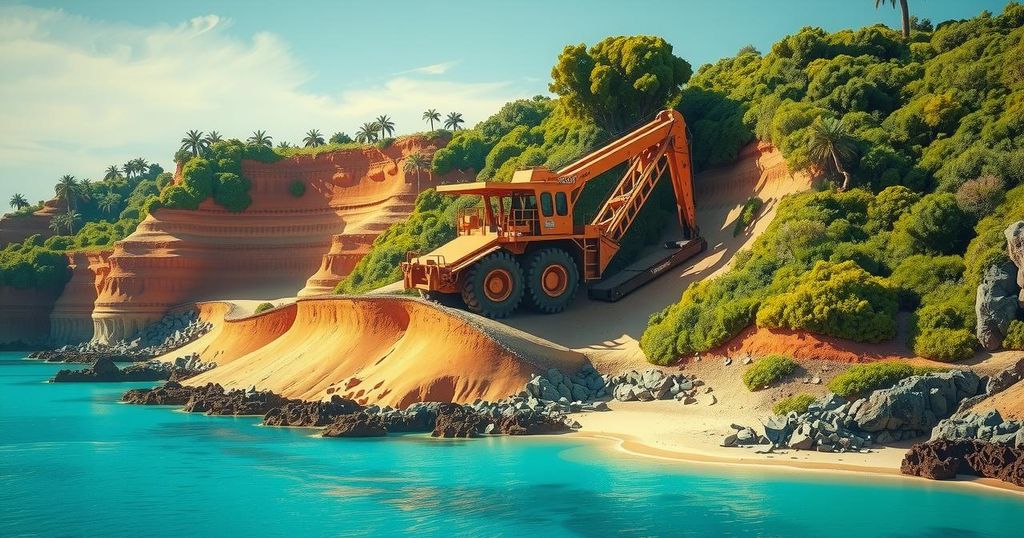Impact of Giant Mining Dredger on Senegal’s Coastal Agriculture

The world’s largest mining dredger, operated by Eramet, is drastically consuming fertile coastal land in Senegal, displacing thousands of farmers and threatening local ecosystems. The controversial operations have drawn criticism over inadequate compensation and environmental degradation. President Bassirou Diomaye Faye has called for transparency and accountability, while community leaders demand a halt to mining to assess its impacts. Despite claims of economic benefits, local discontent and calls for a moratorium persist.
In Senegal, a massive mining dredger, described as the world’s largest, is rapidly consuming fertile coastal land essential for vegetable cultivation. This industrial operation has left a significant scar, visible from space, while it extracts zircon, a mineral utilized in ceramics and construction. Thousands of farmers have been displaced in the process, raising concerns regarding the sustainability of the environment and local livelihoods.
The mine’s operations, conducted by the French company Eramet, have attracted criticism for their alleged destruction of the local ecosystem and disregard for community welfare. Mayor Gora Gaye of Diokoul Diawrigne district noted the despair residents face, stating that the mining has led to broken promises and economic regression. Local protests seeking a halt to mining activities have gained traction, leading to discussions about the social and ecological impacts of such practices.
Senegal’s President Bassirou Diomaye Faye has recently called for greater transparency and accountability in resource extraction. His administration aims to prioritize local communities affected by mining, distanced from the historical influence of France. Eramet commenced operations in 2014, having acquired permission under the prior government, while the state retains a minority stake in the venture.
Eramet claims to adhere to its commitments, asserting that compensation offered to displaced individuals exceeds national guidelines. However, many affected community members express dissatisfaction, citing that the payout does not compensate for the long-term loss of agricultural productivity. They argue that the mine has irreparably altered their livelihoods and the environment.
Some locals have reportedly received new housing as promised by the mining company, yet others, like Omar Keita, recount hardships in their new situations, desiring their original lands and a return to their previous way of life. Despite the company’s assertions of respect for the law and economic benefit generation, residents are skeptical about their future.
Although the company reports improved tax contributions to Senegal’s budget, community frustration continues. Calls for a moratorium on mining surface as local officials want comprehensive studies on the mining’s effects. The company contradicts this, arguing that halting operations would harm local employment and economic growth.
Currently, the dredger remains active in ripping through the Lompoul dunes, instigating a battle between environmental conservation and economic development.
The giant dredger operated by Eramet in Senegal has stimulated significant controversy due to the environmental and social repercussions of its mining activities. Local communities express deep concern over displacement, inadequate compensation, and ecological degradation, while the government navigates between ensuring economic development and protecting its citizens’ rights. As calls for a pause in mining operations gain momentum, negotiations for a viable resolution continue to unfold amidst ongoing debates about the sustainability of resource extraction in Senegal.
Original Source: www.france24.com







